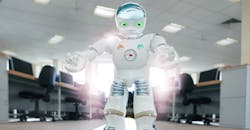Stop me if you’ve heard this one before: New advances in artificial intelligence technologies will fundamentally disrupt the market, replace human workers, and result in massive unemployment.
It’s an old story, one that stretches back to the dawn of the first industrial revolution (and likely before that, too). It’s only that the villain has changed.
As we stand here in a new year in a new decade, these disruption stories likely have us all looking over our shoulders for signs of a technology boot. For some of us, these fears may well be valid. But for most, as I see it, this is just part of the growth process.
I've been on the losing side of this process often in the past, as I would assume many of us have been.
My first steady job was shoveling coal to feed a (very) old furnace at a local minimall. I was about 12 at the time and everyone seemed to agree that this kind of child labor would help “build character.” After a few winters, the job ended exactly as you’d expect—not with a bang (luckily) but with a whimper as the decrepit old furnace finally fizzled out.
I rebounded from that job with a new position manning the music counter at the local VHS rental place. Which ended in something much closer to a bang.
Later, I got a job visually checking school IDs at my university gym. Then, at a… let’s call it an online bookstore startup in Seattle, I called publishers to check their inventory levels all day, every day. I followed that up at about 22 in a Pittsburgh claims office where I took endless stacks of faxed forms and manually typed them into an online database.
I think you can see where I’m going with this.
From this count, I figure I had at least five jobs completely eliminated by technology change in just the first 10 years of my working life.
Looking at that surface-level interpretation of the facts, one could reasonably become pessimistic about the future. But a deeper look tells a different story.
In four of the jobs I described here, technology improvements directly increased the capacity of the businesses, which led to greater sales, greater profits, and added headcount. Better heat meant more vendors at the mall, card scanners meant longer gym hours and more users, self-service claims meant better customer service, and of course, that little online bookstore company did alright.
This is exactly where we are with technology and AI today. It will disrupt some things, it will shift jobs, and re-leverage the brains of organizations. But as it does so, it will help companies produce better products faster, it will streamline orders and deliveries, and it will enable leaders to make better-informed decisions.
All of which will likely mean expansion, new opportunities, and net new jobs.
That is what I’m counting on through this next decade—not tech disruption but tech-driven operational improvements and growth. If we all stay on top of this movement, if we all work to put technology to work, the process should unfold without many bumps.
The only risk, of course, is for those of us stuck selling CDs at a VHS store at the beginning of the computer age—in the wrong industry at the wrong time. That is part of the process, too, and that’s why we’re always looking over our shoulders for the old disruption story. However, I don't believe that narrative should drive the story.
The future is bright, I think. And, with the help of technology, real growth is possible. The disruption on the way to that future is just an inevitable part of the process.
About the Author
Travis Hessman
VP of Content, Endeavor Business Media
Travis Hessman is the VP of Content for Endeavor Business Media. Previously, Travis was the Editor-in-Chief for Industry Week and New Equipment Digest as well as the Group Editorial Director for Endeavor's Manufacturing Group.
He began his career as an intern at IndustryWeek in 2001 and later served as IW's technology and innovation editor. Today, he combines his experience as an educator, a writer, and a journalist to help address some of the most significant challenges in the manufacturing industry, with a particular focus on leadership, training, and the technologies of smart manufacturing.

